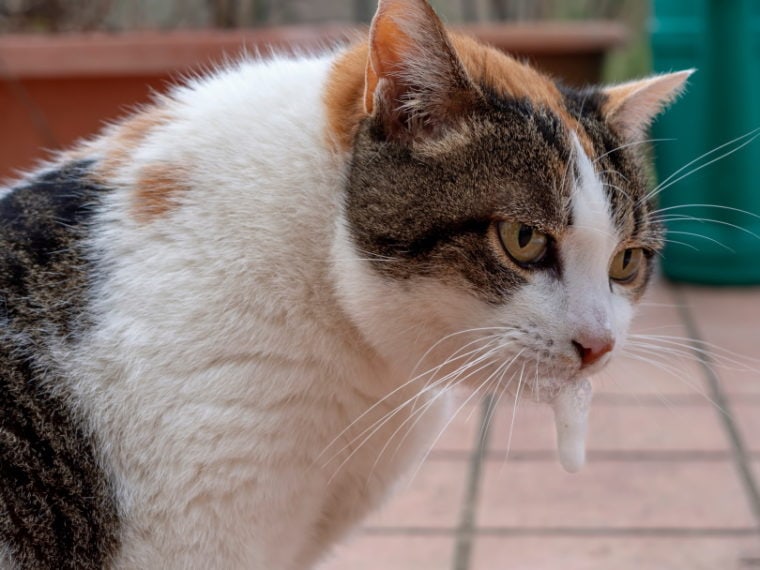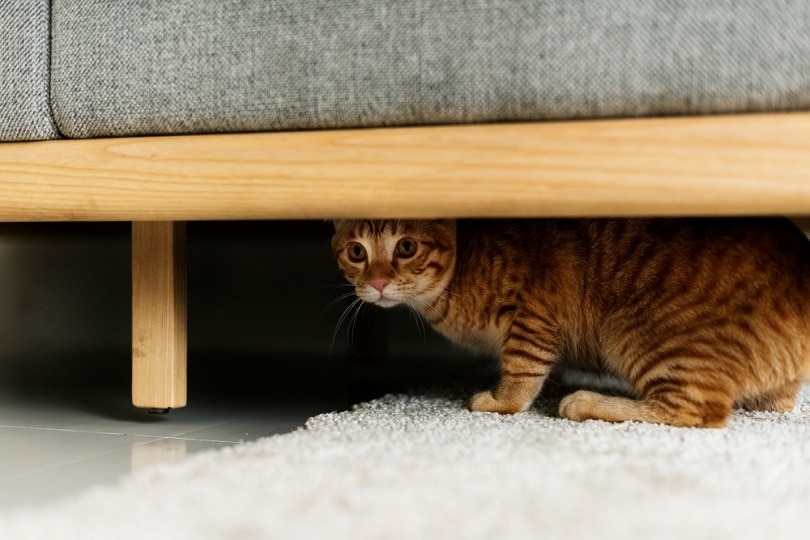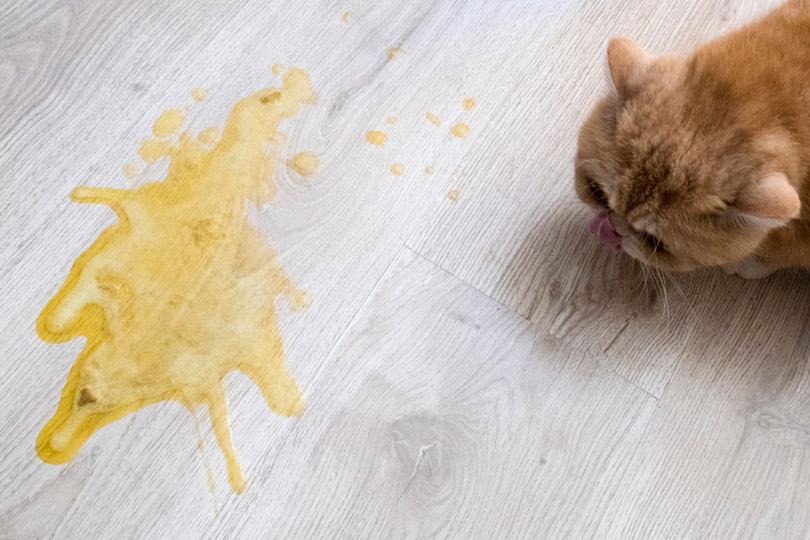Do Cats Vomit When Stressed? Deciphering Your Cat’s Behavior

We will admit it: cats are very good at hiding their stress. (Perhaps because they spend so much time hiding when they’re stressed.) However, cats do tend to develop a few ticks when they are stressed— many of which can be quite troubling.
For instance, overgrooming is a common phenomenon when cats are stressed. Grooming helps them calm down, so they tend to “self-soothe” with it. Furthermore, some cats may vomit or even have diarrhea when stressed.
If you notice your cat vomiting, it may just be because of stress or an actual illness. It is vital to know the difference, as the latter often means it is time to head to your vet’s office. Therefore, we’ll take a close look at how cats react to stress and why they may vomit in this article so that you can tell the difference.
Signs That Your Cat is Stressed
Knowing all the signs of stress in felines can help you determine if vomiting is just another stress symptom or something a bit more serious. Just like people, cats respond to stress in a variety of different ways. Therefore, most cats will not show all of these symptoms.
However, if your feline is vomiting and showing a few signs that they are stressed, then stress is likely the underlying cause of their upset tummy.
- Litterbox Problems: Many cats will stop using the litterbox when stressed, especially if they are hiding or if the litterbox is somewhere stressful. For instance, if you have the litterbox in the hall and then have friends over, your cat may avoid the hall to avoid your friends. In the end, this means that they may start using the bathroom elsewhere. (However, litterbox problems can also be a sign of a UTI.)
- Overgrooming: As we briefly stated before, overgrooming is another common problem. Grooming induces dopamine secretion, so many cats will use it as a type of medication against anxiety. Sometimes, cats overgroom to the point of hair loss and sores. In fact, it can even lead to infections. (However, overgrooming can also be a sign of pain, since it is also a natural pain reliever.)
- Hiding: Many cats hide when they are stressed, especially if it is a particular person or animal that is making them stressed. By hiding, cats avoid their stressor, so it only makes sense.
- Urine Marking: When stressed, many cats will try to control what they can, which often means marking their territory. Even if your cat wasn’t prone to urine marking before, stress can easily bring out the behavior.
- Becoming Talkative. When they are stressed, many cats may begin meowing incessantly. Just like when your feline is hungry, they may also meow at you in an attempt to make you fix the stressful situation.
- Aggression: Many cats become angry and aggressive when stressed. They may start lashing out against their owners and other pets. Just like people, this is a normal reaction to stress. The cat perceives that something is a threat and is trying to protect itself. Therefore, they may lash out at just about anything.

Why Do Cats Suddenly Vomit?
There are several reasons why cats may vomit without an obvious reason. Of course, cats can vomit because they are stressed—as we have previously stated. However, stomach problems of all sorts can also cause vomiting.
For instance, many cats may eat too fast or too much food. In this case, they may vomit up the excess when they are done. Sometimes, cats may eat something that they are not supposed to, like a piece of string. Their body may attempt to vomit it up (or even successfully vomit it up).
Sometimes, cats may also develop hairballs. While we see hairballs as “normal,” this is not normal behavior in the least. It could be a sign that you are not brushing your cat enough, or it can be a regular sign of stress.
It is also important to note that refusing food is not always a sign of a “finicky” cat, but a stressed or sick one.
Most of the above reasons are pretty benign. However, there are also many serious conditions that can cause vomiting in cats including:
Medical conditions that can induce vomit
- Infections
- Cancer
- Diabetes
- Food allergies
- Foreign objects in their digestive tract
- Hyperthyroidism
- Inflammatory Bowel Disease
- Intestinal Parasites
- Kidney Disease
- Poisoning
Many of these conditions are life-threatening and need veterinary attention. Many cats are very good at hiding their symptoms, though, so you may not notice anything is wrong until things are very wrong. Vomiting can be an early sign of many of these conditions.
Luckily, many conditions can be treated when caught early. Therefore, if you notice your cat throwing up more than usual, it may be time to take a trip to the vet.
And when you get home…
If you’re over your house smelling like you’ve got a pet, it’s time to check out the Hepper Advanced Bio-Enzyme Pet Stain & Odor Eliminator Spray! It removes even the most stubborn smells and stains and comes with a 100% satisfaction guarantee. Click here to find out more about this amazing product.
At Pet Keen, we’ve admired Hepper for many years, and decided to take a controlling ownership interest so that we could benefit from the outstanding products of this cool cat company!
Troublesome Signs to Look For
Determining when to visit the vet and when vomiting may be normal is difficult. For instance, if your cat is overgrooming, vomiting, and urinating outside the litter box, it could be a sign that they are just stressed— or they may have a painful UTI.
Here is a list of serious signs to watch out for. If these symptoms are paired with vomiting, it is probably a sign that your cat needs to get seen by a vet:
Serious signs
- Blood in their vomit
- Access to toxic plants, foods, or substances
- Change in appetite or eating habits
- Change in diet
- If other cats or animals are affected in your household
- Lethargy or depression
- Pain in their abdomen
- Weight loss
All of these symptoms are quite serious. We recommend you take your cat to the vet right away if any of them develop alongside vomiting (or even by themselves).

How to Tell the Difference?
The difference between a cat that is vomiting because they are sick and one vomiting because they are stressed can be difficult to distinguish.
Sometimes, you can look at your cat’s environment and behavior to determine what group they belong to. For instance, if you have friends over and your cat begins to show any signs that they are stressed, it is probably just stress.
However, if your cat is acting a bit lethargic, vomiting, and has no obvious reason to be stressed, it may be that they are sick.
Of course, in practice, this is often quite difficult. For instance, there are many things that may bother our cats that we don’t really consider stressful.
When in doubt, it is always better to take your feline to the vet if you are concerned. The worst they can tell you is that your cat is perfectly healthy.
Conclusion
Cats can vomit when they are stressed. However, they can also be a sign of an underlying sickness. While cats do get the stomach bug just like us they may also vomit for more serious reasons, such as eating a toxic plant.
Determining exactly why your cat is vomiting can be difficult. You can keep an eye out for other symptoms, which can sometimes point you one way or the other. However, when in doubt, it is best to contact your vet. Sometimes, they may not ask you to come in. However, other times, they may suggest that the problem could be serious and request that you make an appointment.
See also:
Featured Image Credit: Hunt Han, Unsplash






Không có nhận xét nào